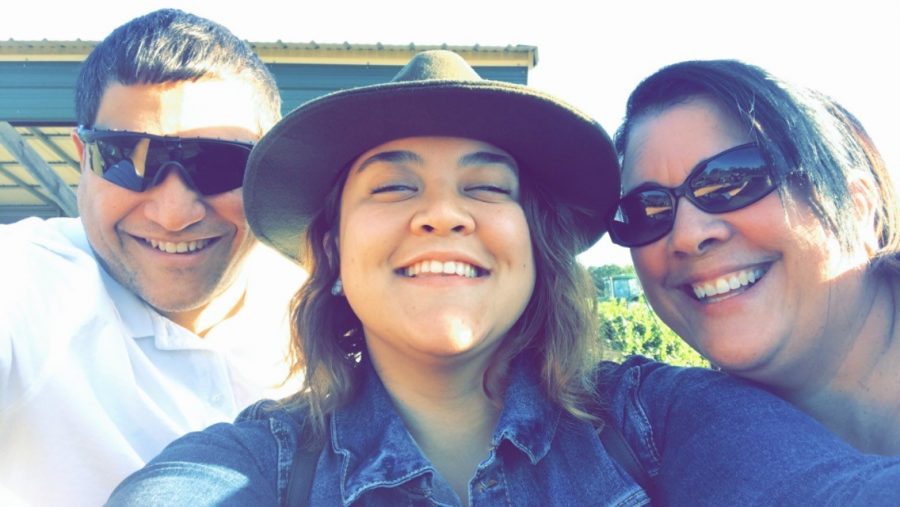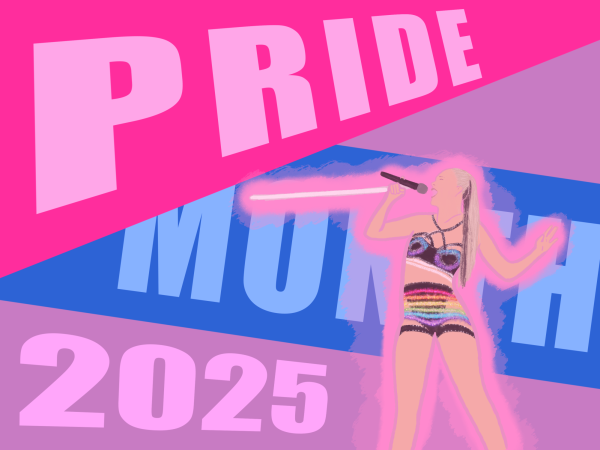Speak your name: The struggle of having to make your name ‘easier’
Alejandra Rodriguez-Aguero
Writer Alejandra Rodriguez-Aguero (center) with her father, Gerardo Rodriguez, and mother, Alma Aguero, at a pumpkin patch.
One’s name is quite a staple of who they are, their overall identity. “What is your name?” is, seemingly, an innocent question that many people begin first-time interactions with, but to me, it is a hurdle that I must overcome every single time. The response to this question is not one-worded for me, but rather, on average, a sentence-long response, “No, it is like Alejandro—yes the Lady Gaga song—but with an ‘a’ at the end.”
Recently I read this article, “Names That Are Unfamiliar to You Aren’t ‘Hard,’ They’re ‘Unpracticed’” by N’Jameh Camara, and it spoke to every inch of me. It hit every point that I have ever wanted to explain to someone who struggled with saying my name and proceeded to beg me to come up with a nickname that would be “easier.” The line that most stood out to me was, “For a white person to suggest that a colleague of color adapt their name to make it easier for others in the work environment is an aggression that infers it is socially acceptable for one individual to put a nickname upon another for their convenience.”
We live in a society that throws around the word “racist” often. To me, that is a word that holds quite some baggage, and so when it comes to my life, I never thought I was a victim of racism. But, having recently learned about microaggressions, I resonated with the quote from the article above a lot. In short, “microaggression” was a term introduced in the 1970s by Chester Pierce, a psychiatrist, meaning a subtle behavior, whether verbal or non-verbal, conscious or unconscious, directed at a member of a marginalized group that leaves a person asking themselves, “was that because I am ___?” This is the type of racism I have experienced more of, but I am not immune to the more overt kind either.
I did not think much of it when younger. Perhaps because I had been the butt of many jokes—“What was it like crossing the border?” “Shouldn’t she have to show her green card to get onto the bus?”—I had repressed the need to assert myself and my name in any situation.
I took on my first convenient nickname when I was in second grade because my teacher, whose thick Southern accent constantly reminded me of the world I was living in, just could not say my four-syllable name. It was “Ally”—for that whole year, I was Ally. It felt offensive.
When I was a junior in high school, I let my history teacher call me “Alondra” for that whole year because I wanted to appease him—maybe it was not him that I was really trying to appease, but rather my peers, those whose expectations I thought I had to live up to. Perhaps it was society, as a whole, that I wanted to appease. I was just begging to be accepted, to be a part of the group. I was wrong to think that I could ever fit into that mold, but one learns to adapt in order to survive.
The last nickname I took on, slightly more like me, but still not me, was “Alex”; I used this one up until a few months ago. This one felt different because as an avid baseball watcher, so I related it back to A-Rod. Wanting to be more white-American, I allowed this one to stick. In school when the teachers would do the usual, “If I mispronounce your name or if you go by something else, let me know” spiel, I would anticipate my name. When that long pause came, I stepped in to help with, “You can just call me Alex.”
This name-hurdle phenomenon, as I like to think of it now, does not just occur in the classroom; it follows me everywhere I go. It happens when I am at those restaurants where you have to give your name for the order; it happens when I am filling out paperwork, and it takes me slightly longer because I have to make sure I fit all 29 letters into that small space.
It especially happens in social settings, like this: I am at the bar and I meet a cute guy. He asks my name, and then after I have clearly said, “Alejandra,” he responds with, “Alejandro?” At that point, I do not even correct them; I let them catch up with their mistake, they laugh, embarrassment registering on their face.
It has been a process to overcome this, but every day I come across something that makes it easier and allows me to take one more step in the right direction. With the passing of homecoming, I started following our newly-crowned queen on Instagram because come on, have you seen the pictures she takes? However, I digress, but when I saw her hashtag, #TakeUpSpace, I felt this thing—I do not quite know how to explain the feeling. Perhaps, if we had to put a word to it, it was validation.
I have always shied away from power stances, speaking my mind, raising my hand in class and all these behaviors that bring attention to me. Anywhere I go, I sit scooped up with my head down, sometimes my hand on my neck, which is a manifestation of feeling powerless. This is the result of constantly being put down for who you are. However, this newfound embrace of my name has sort of pushed me to take up space; 29 letters take up quite a lot of space, and I have never been more grateful that my name is what it is.
In all honesty, I had never really thought about the importance of my name, its meaning—“defender of mankind”—and how it is representative of my Puerto Rican and Cuban roots, my culture and my people until I got to college. I was asked, just last week, this question: “When do you feel most like your name?”
Had this question been asked to me ten years ago, I would have said, “When I am with my family because, with them, I get to be myself.” Or, “When I am cooped up in my room, writing, and it is just me, the pen and paper.” However, now that I have grown to embrace my name, wearing it as a gold medalist who has conquered the 400 meters hurdles, I feel like my name everywhere I go.








Kathy Torres • Mar 6, 2020 at 11:09 am
Kudos to you, Alejandra! As a Hispanic and an ESL teacher, I have experienced first hand what you describe here. I have seen my students faces lit up when I pronounce their names correctly. I have also witnessed their helplessness when teachers decide, on their own,to call them something else. Like you said, their name is part of who they are. It’s one of the few things they brought with them when they immigrated. It’s one part of them that they don’t wish it changes once they acculturate. If you don’t mind, I would like to share this with my students. Knowing others have had similar experiences will surely bring them comfort.